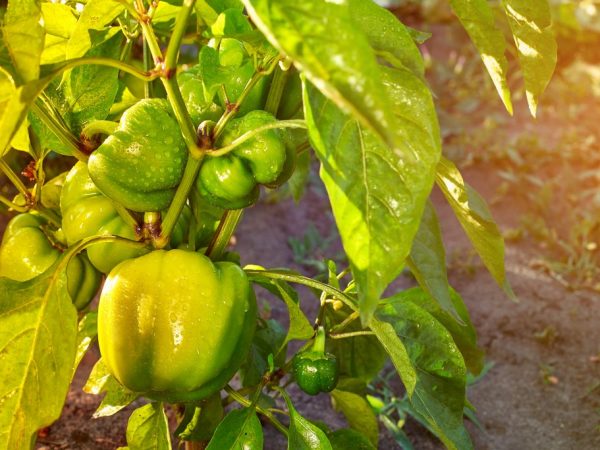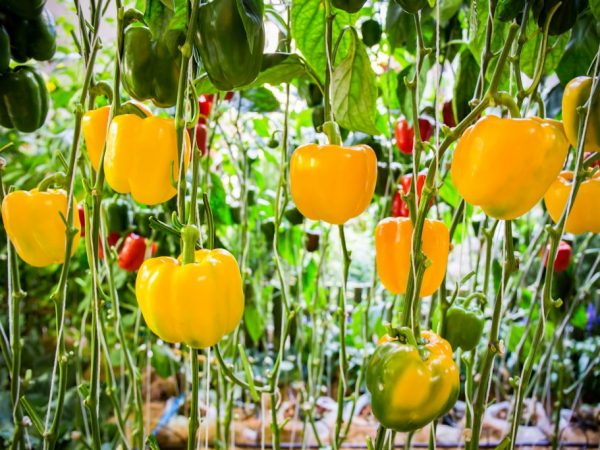What will help speed up the ripening of peppers
The climatic conditions of our region do not always contribute to the full ripening of fruits. At the end of summer, when the nights are short and cool, this problem becomes very urgent. Experienced gardeners recommend speeding up the ripening of peppers on their own.

Acceleration of pepper ripening
Correct fit
To get a large harvest of ripe paprika, lay the conditions for this at the very early stages of culture development. Its further development and the timing of fruit ripening depend on planting a plant.
- Temperature. Using the rule, the earlier you plant, the earlier you will get the harvest, you can be extremely careful. This will work in warm climates. In other cases, you can plant a crop only in well-heated soil.
- Plant the plant in a permanent place during the period when a stable comfortable temperature is established. Thermometer readings should not fall below 180C during the day and 140C at night.
- Lighting. Paprika bushes love light. Divide the plot for the beds for this culture in well-lit places. When planting different varieties of plants, place them correctly. Allocate a site in the center of the garden for tall crops, undersized crops will feel great along the edges of the garden.
- Thickening. Follow the sweet pepper planting pattern. During the growing season, the plant becomes powerful, spreading. Nearby bushes will interfere with each other. Lack of light and nutrients will negatively affect the timing of fruit ripening.
- Priming. The culture loves fertile and light soil. Before planting, be sure to fertilize the soil in the beds with organic fertilizers. Add dolomite flour to reduce the acidity of the soil. To give lightness to the soil, periodically loosen the beds.
- Fertilizers. Do not neglect feeding. For each period of culture development, certain nutrients are needed. Do not fertilize the plant with nitrogen during flowering or fruiting. A properly organized diet helps to reduce the ripening of fruits.
- Watering. Water the pepper rarely, but abundantly. The creation of high humidity for the culture will result in the development of fungal and bacterial diseases.
Topping
For the normal development of culture, two or three shoots are enough. Pinching the bushes will force the plant to conserve its energy and accelerate the ripening of the peppers. Experienced gardeners proceed as follows:
- on a still small bush, the crown bud is removed;
- during the period of active flowering, barren flowers are cut off;
- during the entire period of growth, they get rid of unnecessary shoots;
- at the end of summer, absolutely all flowers are plucked;
- in the period of approaching cold weather, small peppercorns are collected, which will not reach the period of maturity.
These simple manipulations allow the culture to devote all its resources to the ripening of the fruit set.
Recommendations

You need to water with warm water
Gardeners have been convinced in practice that it is possible to speed up the ripening of paprika fruits by resorting to little tricks.These include:
- creation of additional shelters;
- maintaining optimal temperature conditions;
- watering the culture with hot water;
- foliar feeding of the plant;
- removal of deciduous mass.
Sheltering
After planting seedlings in a permanent place, observe a constant favorable temperature regime. For peppers, the comfort zone is in the range from 200C to 250C during the daytime and from 150C to 180C at night.
To ensure this, construct a plant shelter. Use non-woven fabric, agrofiber. Cover crop beds as needed.
Continue to use such shelters during the first autumn cold weather. This way you can harvest before frost.
Airing
In late summer and early autumn, condensation forms in greenhouses due to differences in day and night temperatures. This leads to the multiplication of pathogenic fungi and pathogenic bacteria. The plant stops developing.
To get rid of this problem, ventilate the greenhouse. Leave the room open during the day and close it at night.
For those bushes that grow outdoors, take care of film shelters at night.
Warm water
To speed up the ripening of tomatoes and peppers, gardeners are advised to use rather hot water for irrigating crops in cold weather. Its temperature can be from 40 to 600C. Water the plant at the root, try not to pour water on the leaves.
Foliar dressing
During the period of mass formation of ovaries, spray the culture once every ten days. Use weak solutions of phosphorus-potassium fertilizers or wood ash infusion.
In specialized stores, drugs appeared - stimulants of the formation of fruits. Such formulations are not recommended for use in late August and autumn. They will provoke the formation of new peppercorns, and the existing fruits will cease to ripen.
Tearing off foliage
When peppers are imposed on the bushes, they do not need leaves for ripening. Tear off some of the leaves. This will allow the plant to redirect forces towards ripening the fruit. Do not be zealous, you should not cut off all the foliage. This can cause burns to the ovaries themselves.
Artificial maturation
Paprika has two stages of maturation - technical and biological.
You can use the fruits already on the first of them. Technically, a ripe fruit has all the properties of a biologically ripe fruit, except for color. It has a light green color.
To speed up the ripening of the peppers, use the artificial ripening method. To do this, remove technically ripe peppercorns. Store them in a warm, dark place. In three to four days, you will have a wonderful red bell pepper. Thanks to this method, the rest of the fruits will ripen faster.
It is easy to speed up the ripening process of peppers. It is enough to redistribute the strength of the plant in the right directions. Use several methods to achieve the result.


